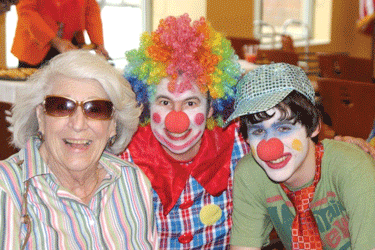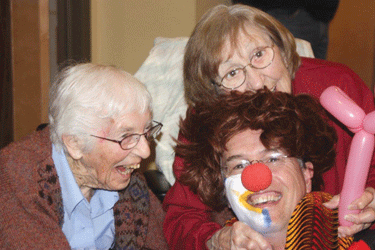Mitzvah Clowning offers unique way for local volunteers of all ages to connect with Sholom residents
By ERIN ELLIOTT BRYAN / Community News Editor
“You shall rise before the aged and show deference to the old…” — Leviticus 19:32
For local photographer Sue Lund, the Mitzvah Clowning program fulfilled a dream.
“It’s always been a dream of mine to do this, which is why I signed up for it,” Lund told the AJW. “I love being a clown… It’s a wonderful thing, to really bring cheer.”
Lund, a self-taught clown, has volunteered as Mount Zion Temple’s Purim clown for years and also appears as a clown at children’s birthday parties. But when she heard about the Mitzvah Clowning program, she knew she wanted to participate.
“I’ve just always wanted to bring my clowning to other areas, from kids to adults,” Lund said. “I’m all about bringing joy and it’s always been something I wanted to do.”
Lund is the local coordinator of the Twin Cities Mitzvah Clowning program, which is facilitated by New Jersey-based Areyvut. The local program began in March and has committed to visiting the residents of the Shaller Family Sholom Home East campus in St. Paul.
Since its inception, the local program has made four visits. Its next visit is scheduled for Sunday, Dec. 4.
 Sue Lund (center) and her son, Jeremy, visit with a resident at Sholom Home East in St. Paul. (Photos: Courtesy of Sue Lund)
Sue Lund (center) and her son, Jeremy, visit with a resident at Sholom Home East in St. Paul. (Photos: Courtesy of Sue Lund)
According to its Web site, Areyvut enables Jewish youth to infuse their lives with the core Jewish values of chesed (kindness), tzedaka (charity) and tikkun olam (social action). The organization’s Mitzvah Clowning program introduces the Jewish value of bikkur cholim (visiting the sick) and is open to volunteers of all ages.
“It’s people working together to make a profound impact on the community,” Daniel Rothner, Areyvut’s founder and director, told the AJW. “They visit Sholom Home and that’s had a profound difference there. The residents get excited and look forward to the visits.”
Rothner came to St. Paul to lead the first training in March, and trained 16 local clowns — both youth and adults, both Jewish and non-Jewish. To date, Areyvut has trained more than 170 Mitzvah clowns; the Minnesota group is the only other formal Mitzvah Clowning program Areyvut facilitates outside of New York or New Jersey.
“Mitzvah Clowning is similar to the Patch Adams concept or Caring Clowning or Medical Clowning,” Rothner said. “At its core, you’re visiting with someone and you’re cheering them up. It’s not a performance… and they’re not trained medically, but they’re there to visit, to lend a hand, to listen, to hang out, to interact, to enjoy each other’s company.”
Rothner pointed out that this type of community service project is unique and not something that volunteers normally do. Participant Gloria Cramer agreed.
“I’m so glad my friend asked me to do this,” Cramer said following the initial training. “This is not something I would have sought out to do, but becoming a clown was so much fun, and the people we visited really seemed to enjoy it, too. Altogether, a great experience! I can’t wait to do it again.”
Trained Mitzvah clowns pay a fee to participate and receive a “clown kit” with a clown outfit, makeup and balloon pump, among other items. They receive instruction on how to apply the makeup and how to make three types of balloon animals, and choose their own clown name. No experience is needed to become a Mitzvah clown — and it’s a great idea for a Bar or Bat Mitzva project.
 Todd Marshall (center) enjoys a laugh with Sholom residents.
Todd Marshall (center) enjoys a laugh with Sholom residents.
Lund, who is known as Simcha Sue and wears a kipa on her clown wig, is participating in the program with her son, Jeremy, who is known as Shiny. She said this program is a “wonderful way to volunteer your time for Sholom Home.”
“It’s one of the best mitzvas I’ve ever done, in terms of making people feel good and visiting the elderly and brightening their day,” Lund said, noting that the program is rooted in the Jewish values she thinks about when studying Torah. “The idea is that you want to visit people who are sick, elderly or have special needs… And you’re really stopping other people from feeling lonely, sad or hurt.”
Natalie Kuklinski is Sholom Home East’s recreation director. She said the impact of the Mitzvah Clowning program on Sholom’s residents has been “absolutely wonderful.”
“The residents really, really enjoy their visits,” Kuklinski said. “I know the [clowns] take extra time to spend an extended amount of time with each resident and they really like that one-on-one attention.”
Kuklinski said the Mitzvah clowns enrich the lives of the Sholom residents and take the time to engage them in songs and conversation. She said it’s also an important way for residents to remain connected to the Jewish community.
But Kuklinski said the clowns also make an impact on the families, staff and other volunteers.
“They really enjoy the clowns’ visits,” she said. “[Families] like to see their loved ones come down…and they also like to participate in the program.”
The Twin Cities Mitzvah Clowning program is open to volunteers of all ages. The group is looking for 10 new clowns before Aug. 15, 2012; Rothner plans to conduct another training here next fall.
For Lund, Mitzvah Clowning is a natural fit for how she lives her life.
“My mission with the Mitzvah Clowning — and everything else I do — is to spread joy and laughter, love and peace,” Lund said. “I do that through serving others in various capacities, whether it’s by capturing lifecycle moments through my photography or spreading love and joy through my clowning.”
***
For information on the Twin Cities Mitzvah Clowning program, contact Sue Lund at 952-892-0451 or: sue@suelundphoto.com.
(American Jewish World, 11.25.11)









 Sue Lund (center) and her son, Jeremy, visit with a resident at Sholom Home East in St. Paul. (Photos: Courtesy of Sue Lund)
Sue Lund (center) and her son, Jeremy, visit with a resident at Sholom Home East in St. Paul. (Photos: Courtesy of Sue Lund) Todd Marshall (center) enjoys a laugh with Sholom residents.
Todd Marshall (center) enjoys a laugh with Sholom residents.









